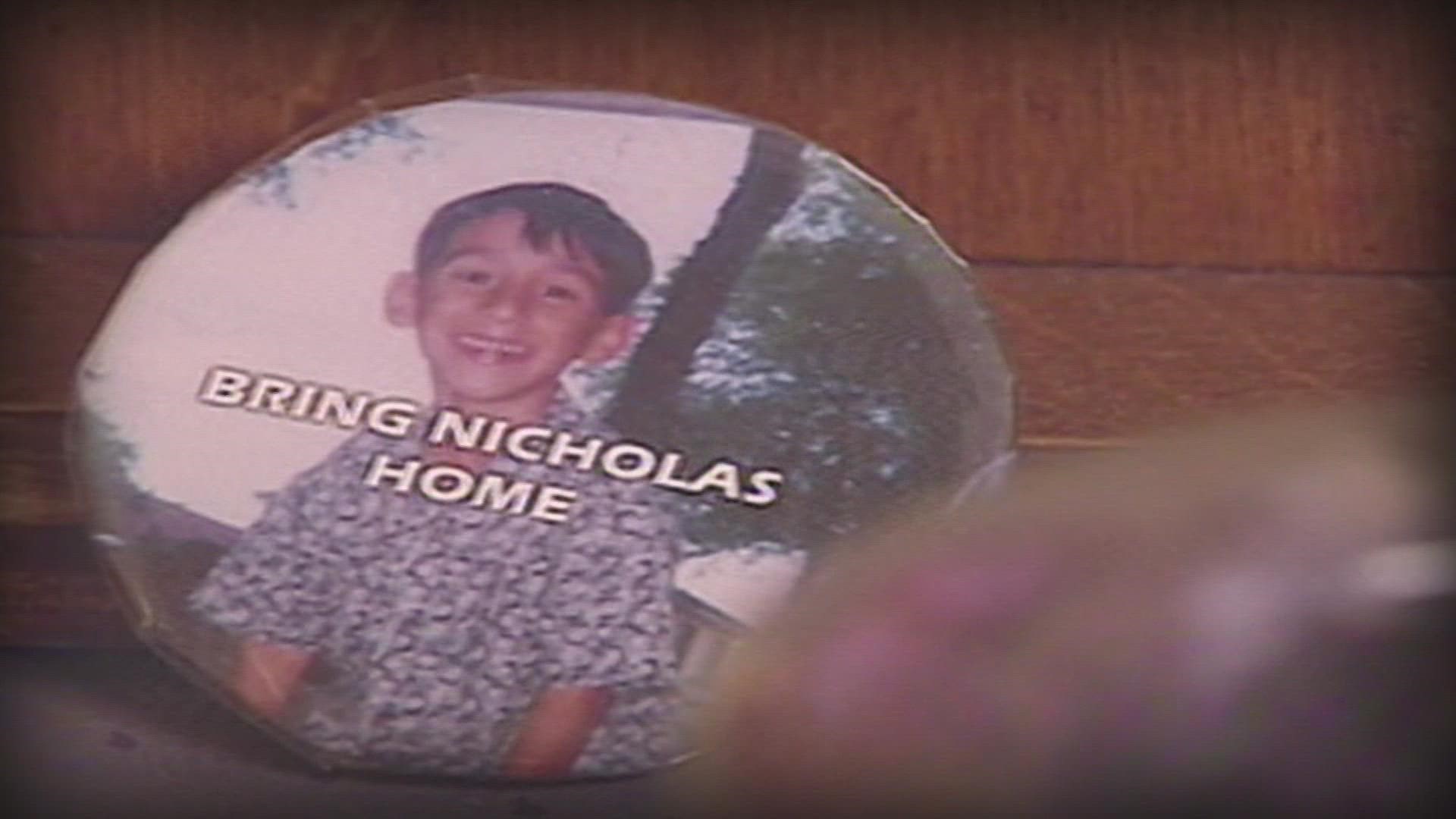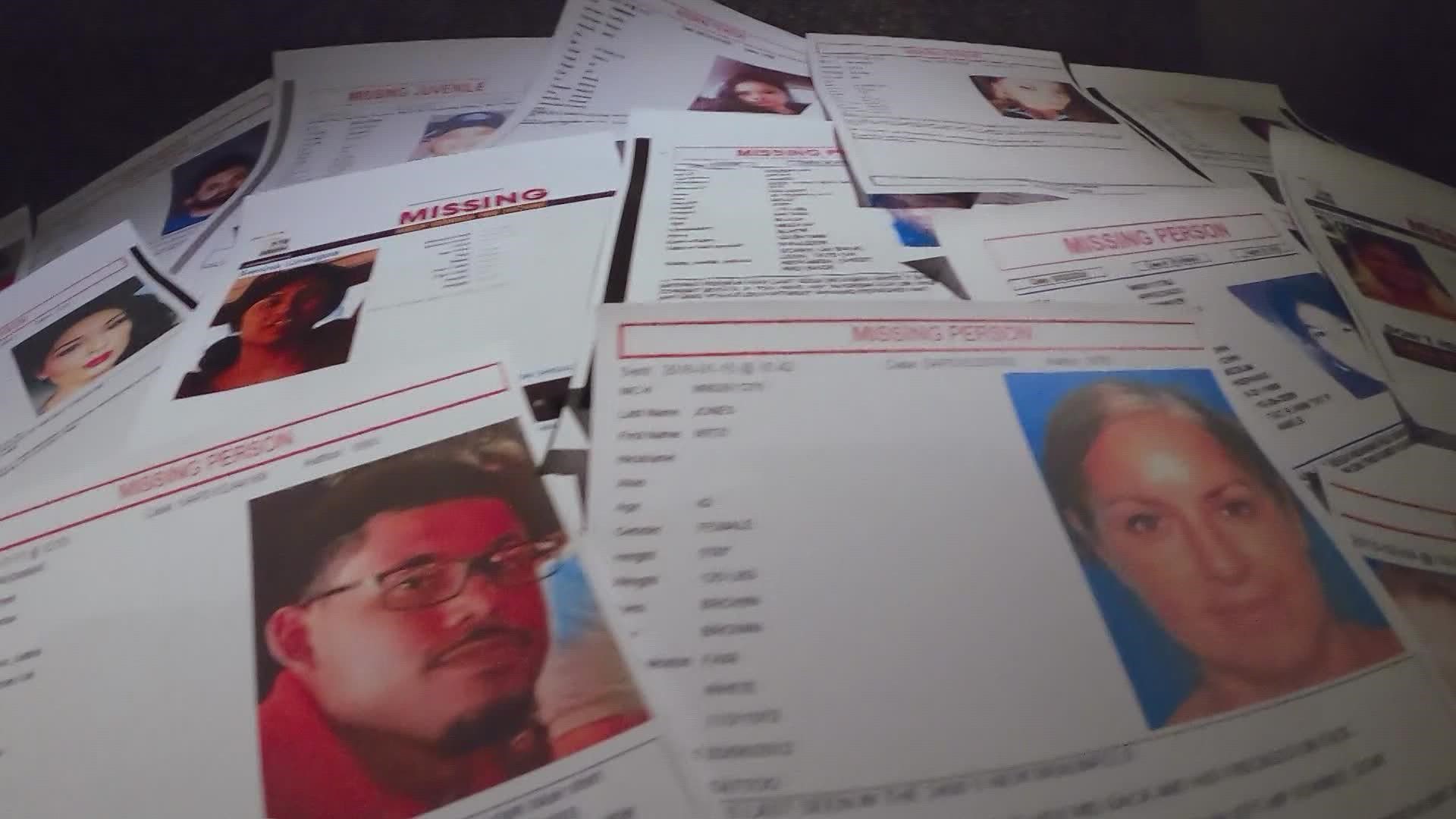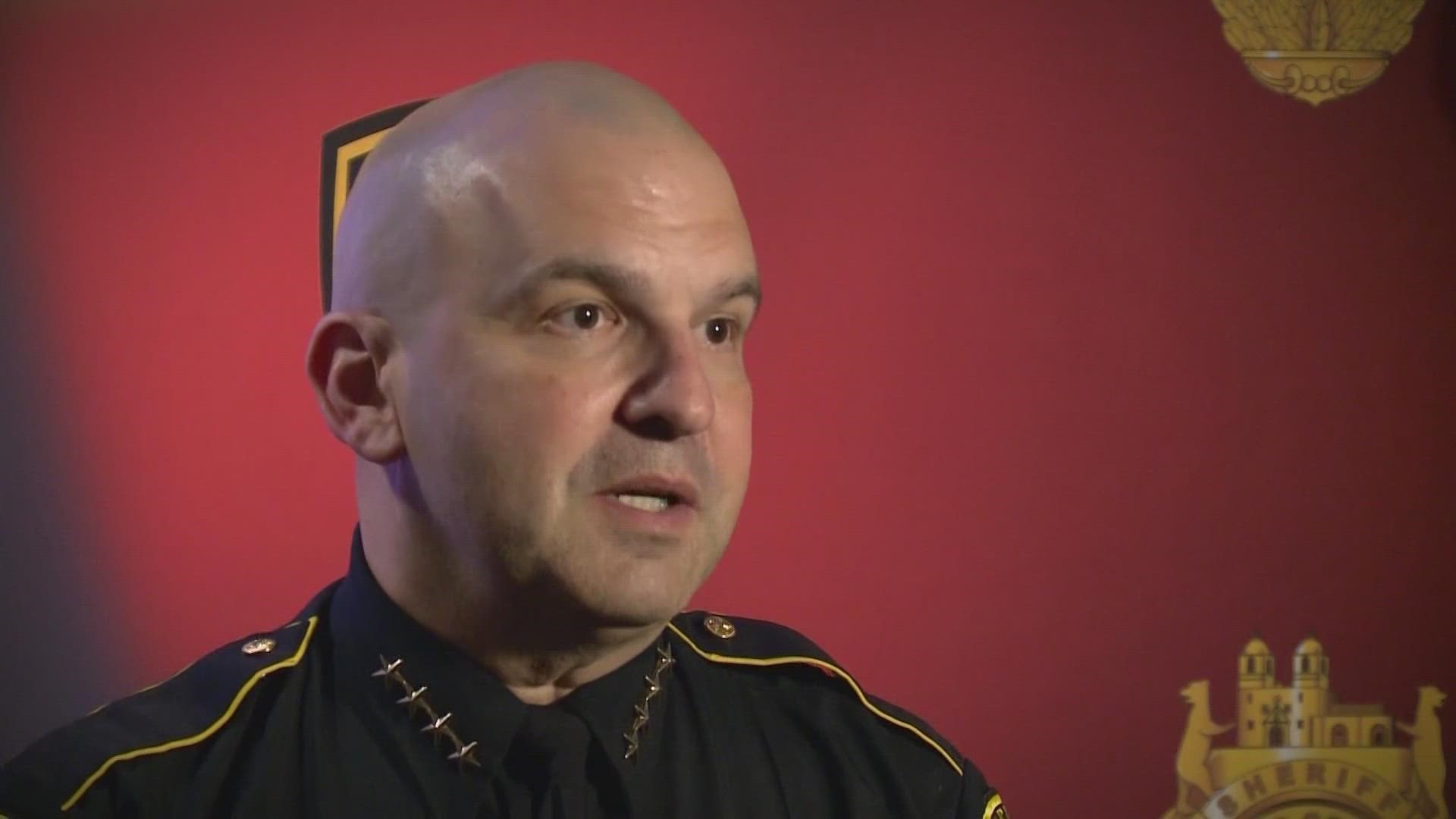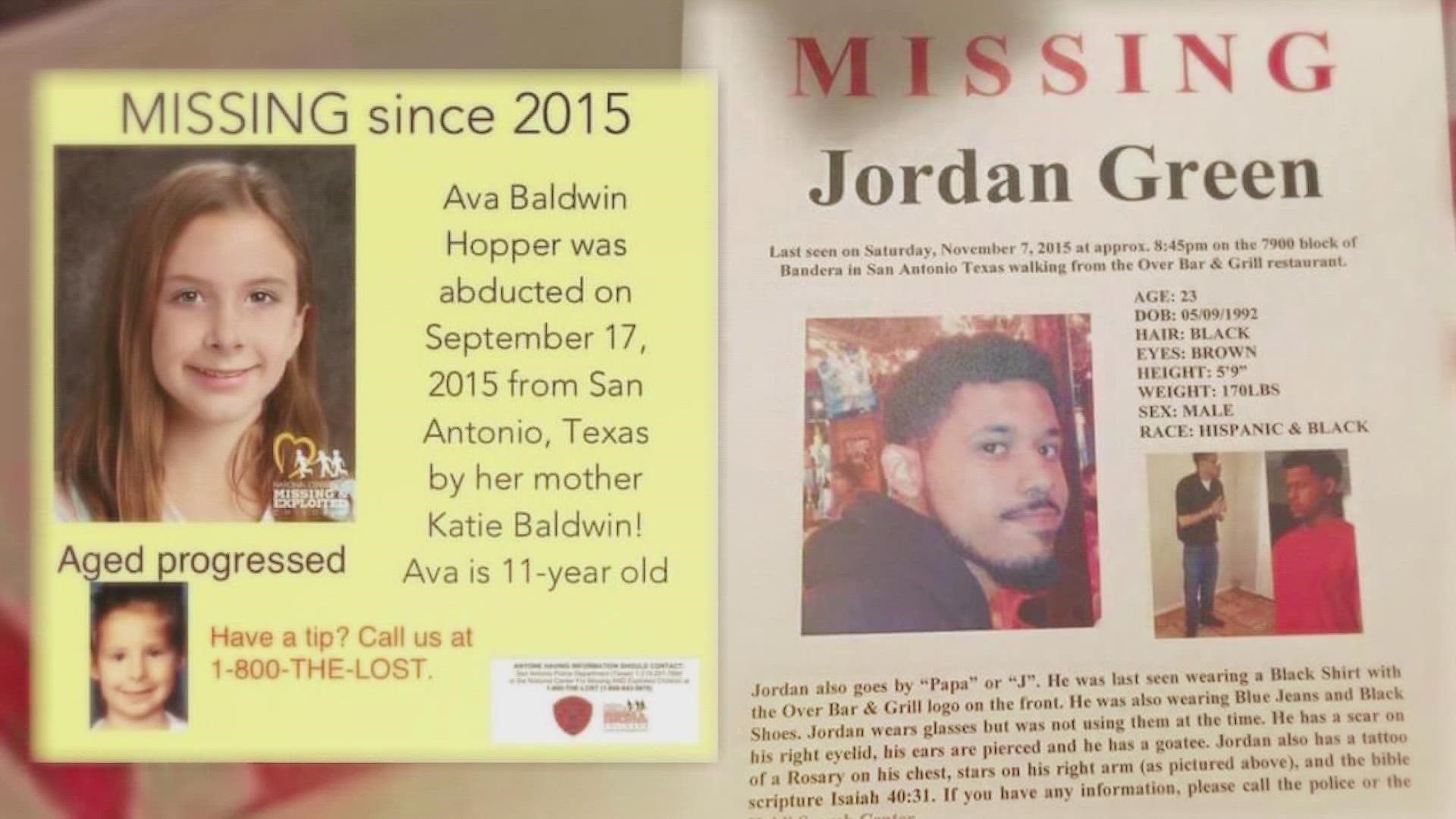Unsolved San Antonio: Families searching for missing loved ones still holding out hope
Thousands of families carry the scar of having a loved one here today and gone instantly.
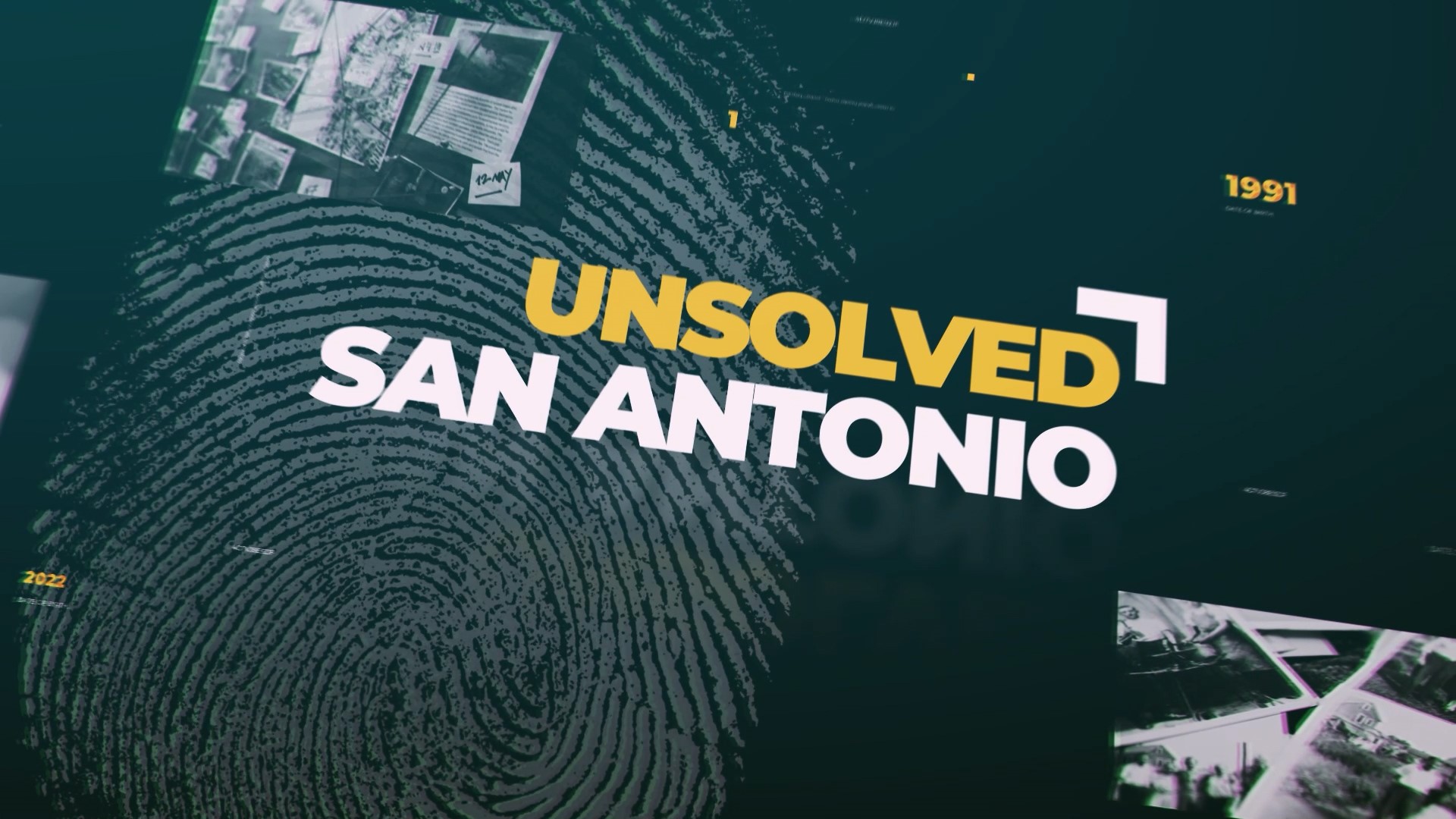
Thousands of families carry the scar of having a loved one here today and gone instantly—no accurate answers to their whereabouts. It is a mark permeating walls of faith and can produce an inconclusive outcome. Perhaps the "mark" of the missing is invisible to the eye, yet it's as evident for those suffering as the rising sun and high-hanging moon.
There's a chance it may leave 'the missing' and their loved ones with the cure of being 'the found.' But there will always be a mark.
Here in San Antonio, KENS 5 is drawing attention to the dozens of children and adults who remain missing in hopes that someone in the community knows something that will help find them. You can find more information about dozens of currently missing people here.
Dottie Laster "It's the hardest work I've ever done"
Dottie Laster's work puts her at the nexus of missing person cases and human trafficking.
A former executive director of San Antonio's Heidi Search Center, she continues to rescue the missing from potentially horrible outcomes.
"So I still spend a lot of time rescuing teens and young adults who had started with someone that said hi online, and now they're gone," Laster said.
The mention of the Heidi Search Center, which closed four years ago, brings a swell of emotion.
"I still choke up," Laster said.
She said the non-profit, whose mission was to help others with the missing, advocated uniquely. And it's the fliers they would create---at no cost to the families--- sad, hopeful, and now leave her tearful.
"For some reason, those fliers just choke me up because you realize there's a parent driving around desperately looking for their child like a needle in a haystack," she said. "And they have nothing to leave behind and say, please call me if you see my kid."
The search center got named in honor of Heidi Seeman. On August 4th, 1990, the fifth-grader went missing en route home from a sleepover in San Antonio.
Her body got discovered on August 25th in Wimberly near a rural road. The 11-year-old's killer was never found.
"The missing does affect everyone," Laster said. "In fact, so many times, people would come in my office and say, I never dreamed I'd need your help."
She said our children are not safe in a world filled with people who will steal your kids for illegal gratification. Some, Laster said, would even sell them for $300,000 a pop---which is why she advises parents to be intrusive.
"You cannot parent with privacy," she said. "You cannot say my kid will tell me about this. You can not trust your parenting to save them."
Know what platforms their own, usernames, monitor texts, and find out where your child is being interactive.
She offers a free digital DNA kit for everyone and more lessons compiled in a guide to protect your loved ones.
"It's the hardest work I've ever done," she said.
Bexar Co Sheriff Javier Salazar "Runaway is just a term I don't like to use"Subtitle here
Bexar County Sheriff Javier Salazar said making assumptions is probably the first mistake anyone can make in a missing person case.
"The minute you start assuming he's with his biological mom, it's a parental kidnapping. He's with relatives. He ran away with a girlfriend," Salazar said. "The minute you start assuming too much. That may not be the case."
The second-term sheriff believes each case needs investigation based on its merits.
"The fact is any one of our children could fall victim to something like this at any given time," he said.
Although legally acceptable, Salazar said he strongly encourages his deputies not to use the term 'runaway.' The label is an automatic closed door for the media that may get used to increase the eyes for the missing during an investigation.
The word also, he believes, creates a bias for those who see fliers or a plea for help.
"It just indicates that, look, they did it to themselves," he said. "There's no sense looking for them because they put themselves in a situation."
In his search for the missing, BCSO has one deputy assigned to its missing person unit.
"At any given time, I can go up there and ask him what's going on with this case right here? And he can tell me up to the minute, literally what we're doing with each particular case," Salazar said.
Deputy Raul Arevelo is housed in the County's criminal investigations unit because they provide support and sometimes take over the cases if the incidents become felonious.
"He'll grab a hold of people from street crimes or from the gang unit or from homicide or from the SCORE (Sheriff's Community Oriented Resource and Education) unit," he said. "And then we'll will task them with helping him out with whatever he may need on any particular case."
While Arevelo's boss said the office's sole missing person investigator had some success, this is not a case of less is more. Arevelo is all the office has got.
"It'd be great if we had ten people to assign to this issue," Salazar said. "At this point, that's just not a luxury that we have---with---we have an agency with finite resources."
In May, the sheriff asked Bexar County Commissioners to fund more deputy positions to focus on violent crimes. He said some of those positions would end up in the criminal investigation division supporting Arevelo.
San Antonio police have 20 civilians who work around the clock under sworn supervisory command.
Salazar said his office's system attacks cases with human capital too in barns and closets---to look for the missing.
Arevelo, the sheriff joked, has no days off and no vacation. He said even when his missing person duty is off, BCSO is working to ensure the missing do not get forgotten.
David Hopper "It's a living hell"
David Hopper's marriage to Kathryn Baldwin lasted 34 days, he said. Even though their union was fleeting, it gave him a chance at fatherhood.
"Four or five months later, she calls me and says, you know, I've got I have a little girl, and can I help her out financially?" Hopper said.
Baldwin ghosted him until Ava Grace was born, according to Hopper. But he didn't let that stop him from being a father.
"It's been a chaotic and insane ride since the very beginning," he said.
Hopper said he confirmed paternity and began his duties as a father. He traveled between San Antonio and Oklahoma.
"We stayed at a swimming pool at the Holiday Inn down there in San Antonio," he said. "So we got to swim for three or four days, and we just got to hang out is a wonderful thing."
He remembers the good times: Ava meeting his family, cooking in the kitchen with her, and the heart-tugging videos of his daughter singing and talking to her father. But a call from a school administrator, he said, changed all of that.
"I don't how to tell you this---but your daughter's been missing for 21 days," Hopper recalled.
He got that call in September 2015. She's been missing ever since.
"I have one daughter. And as fate would have it, she's been robbed from me, taken from me---however you want to put it," he said. "Imagine somebody stealing that child. And it's hell. It's a living hell."
Ava would be 13 years old. Her mother is listed as a fugitive. But the case runs cold for investigators who have not been able to find them.
"My faith is that my daughter will return. She will find out how much she was missed. How much she's loved. And I can start having a relationship with her," he said.
In the meantime, on her birthday, they set an empty table decorated for Ava. On Facebook, there's a page dedicated to his daughter for family members to express their love.
Jennifer Green "Nothing but God that keeps me going"'
Nearly 200 miles away from San Antonio in Fort Worth, Jennifer Green bears the weight of a missing child. Her pain comes in waves for the son she describes as a gift.
"He was my mother's day gift," Green said. "He was born the day before mother's day."
Jordan Green, she said, had an infectious smile and giving heart. He was a high school graduate with a year of college under his belt.
Green said her son came to San Antonio to stay with relatives in the summer of 201 while he worked at the Overstreet Bar and Grill.
"He went down there the weekend of July 4th, and November 7th, he went missing," she said.
According to Green, her son was getting ready to move back home when he vanished. She said he was to come home after Thanksgiving but never made it.
"The last time I physically saw him, he held my baby because then a few weeks later, he was gone," she said.
Her hugs and kisses got put on hold for almost seven years. Green believes her son is alive somewhere being held against his will.
"So death--until god lays him prostrate before me is not there," she said. "And hope is what I cling to as his mother."
Fliers, events in Jordan's name, and faith are things that give her hope.
"For me and the thousands of people that have missing individuals in their life... we're on a constant Ferris wheel, and every day brings something different," she said. "But yet the door doesn't unlatch for us to get out," Green said.
She recalls a scripture from the Holy Bible Jordan got tattooed on his stomach because he told her the word of God feeds you---and food goes to the stomach.
"They that wait upon the Lord will renew their strength. They'll mount up on wings as eagles. They'll run and not get weary. They'll walk and never faint," she said.
So, she waits.
George Saidler "He called himself the murderer of Nicholas Plaza"
George Saidler was a seasoned investigator when he got Nicholas Plaza's case.
He hit the streets as a San Antonio police officer in 1975, moved to the SAPD Robbery division in 1987, and became a homicide detective by 1992.
"I had a hard time understanding why we couldn't get this before a jury. There was so much there already," Saidler said.
He moved into cold cases in the early 2000s. Plaza's case got assigned to him in 2002. Saidler is now retired and talking about the investigation in an interview for the first time.
"There was no doubt in my mind that this young child was dead. And people knew about it," he said. "People saw just the atrocity of injuries that had happened to him."
Priscilla Plaza got romantically involved with high school acquaintance Ruben Zavala in March 2001. She moved in with him and his parents on Rock Valley Drive five months later.
"I think he was using the children to control the women," Saidler said.
There was so much control police said there were times her five-year-old Zavala would bathe the child behind closed doors. Saidler said Nicholas went from a healthy and vibrant child to a victim of a crime boxed in a house.
"They talked about he couldn't walk. There was blood in the urine," he said. "There was blood in his stools. He was losing his hair."
The boy got taken out of school due to the injury, and when child welfare officials came to the Rock Valley home, police said Zavala pretended to be a relative with no knowledge of Nicholas' whereabouts.
Nicholas went missing, according to police, on October 23, 2001. A month later, his disappearance got reported to the police, and his mother was still living in the home.
"It was not like she was an innocent bystander in all this," Saidler said. "She certainly had plenty of time to do something about it."
According to Saidler, more than 40 investigators had laid hands on the case, but no one had enough to arrest in the case. He stood on their shoulders but needed something strong and new.
"(A) helpless five-year-old child. That's all I kept thinking about, " he said.
Like a scripted moment in a crime series, Saidler said he woke out of his sleep at 3 am with the idea of partnering with then, Medical director of ChildSafe, Dr. Nancy Kellogg.
According to a University of Texas at San Antonio Health Science spokesperson, Kellogg did not want to comment on this story.
The two worked together to get Priscilla Plaza and Zavala's mother, Celia, to testify to Nicholas' condition. Saidler said the women went on the record about the child's pale, weak, fractured, and fragile condition. But no one got medical attention for the boy, he said.
"The injuries were serious bodily injuries, which were manmade and (he) should have been seen to a doctor," Saidler said.
The challenge, Saidler admitted, was there were no medical reports and no sign of Nicholas, who was presumed dead.
According to the detective, Zavala would not own the child's death. When he got arrested in the case, the suspect insisted he was helping Priscilla. The investigation also found Zavala could multitask.
"Before I got an arrest warrant for him, he was already writing other females who had young children," Saidler said. "So that was one of the things that scared me the most if I couldn't get this man off the streets, that we were going to have another victim."
Zavala faced kidnapping charges for a woman he dated before Priscilla. He took the woman's 18-month-old son when they met at a local restaurant---threatening harm to the child if she did not reunite with him.
Saidler believed their suspect selected certain kinds of women.
"That was another thing---they all happened to be young," he said. "Young boys of these women that he was contacting."
Zavala would eventually get convicted of child injury charges even though prosecutors wanted to try him for murder. A conviction would carry similar time behind bars, and without a body---child injury is all prosecutors could prove.
Zavala is serving a 67-year sentence, and he is also doing time for the kidnapping case. He got sentenced in 2007.
Nicholas' mother agreed to a plea deal to testify against her former boyfriend. She is serving an 18-year sentence.
As for the whereabouts of Nicholas, Zavala claimed he put the boy's body in a south San Antonio dumpster. Without a body, it's impossible to know how he died.
The detective said they traced the dumpster to a landfill. Previous cases taught the police the success rate of recovery in that environment is hard to measure.
"It would take a miracle to find anybody that's been buried out there," he said.
Saidler said police conducted digs and search based on information from Zavala. But he said they felt investigators were getting manipulated by someone they believe is a child killer.
"In two of his letters that he sent to us," he said. "He called himself the murderer of Nicholas Plaza."
Saidler said the boy, who called Zavala daddy, might never get found--- which keeps him listed as a missing person.
Some hold out hope Nicholas is a 26-year-old man---alive and well even though the evidence says differently.


